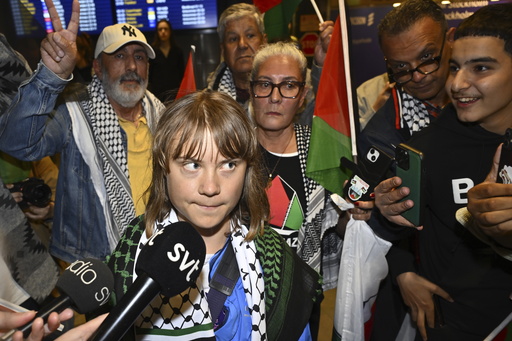In a significant development on Tuesday, Greta Thunberg was deported from Israel following the interception of the Gaza-bound vessel she was traveling on, by Israeli military forces. The climate activist, on landing in Paris, urged for the release of other activists detained alongside her aboard the Madleen. Thunberg recounted the tumultuous experience of her detention, emphasizing that the adversities she faced “are absolutely nothing compared to what people are enduring in Palestine, especially in Gaza right now.” According to the Freedom Flotilla Coalition, who organized the voyage, the mission aimed to challenge Israeli limitations on aid to Gaza’s populace of over 2 million, affected by 20 months of conflict.
Acknowledging the hazards associated with their mission, Thunberg articulated the intention was to reach Gaza and distribute aid, and reiterated their commitment to this cause. A day prior, U.S. President Donald Trump had criticized Thunberg, referring to her as “a young angry person” and suggesting anger management classes. Thunberg, however, dismissed his remarks, opining, “I think the world needs a lot more young angry women.”
Exhausted and without access to communication for days, Thunberg mentioned she was returning to Sweden and exploring the decision to accept deportation by stating, “Why would I want to stay in an Israeli prison more than necessary?” She also called for global support to advocate against systemic oppression faced by Palestinians and emphasized the necessity for nations to recognize Palestine as a minimum step towards resolving the crisis.
Among the 12 people aboard the Madleen, Thunberg was just one of several activists seized by Israeli naval forces around 125 miles off Gaza. The Freedom Flotilla Coalition and other rights groups charged that Israel, in intercepting the vessel within international waters, violated international law, though Israel rebutted these claims, portraying the ship as a mere publicity act with minimal aid supplies.
The coalition revealed that besides Thunberg, two other activists and a journalist had been deported. The Coalition noted this was to share their experiences unreservedly, insisting that their detainment was unlawful and politically driven. Eight others chose against deportation and were being held in Givon prison, with authorities examining their cases.
Legal representative, Lubna Tuma expressed the activists’ collective objective of delivering humanitarian aid and combating severe deprivation in Gaza. Tuma asserted that denying entry of humanitarian assistance exacerbated Israel’s complicity in the Gaza crisis.
Israel’s Interior Ministry spokeswoman, Sabine Haddad, disclosed that activists who renounced their right to appear in court were being deported. Meanwhile, the remaining detainees would face a judicial hearing and be held for 96 hours prior to possible deportation. Among the Madleen passengers was Rima Hassan, a French MEP of Palestinian descent, who faced uncertain fate varying between immediate deportation or continued detention.
French Foreign Minister Jean-Noel Barrot confirmed the impending departure of one deported French activist, while five chose to resist. Meanwhile, on his arrival in Barcelona, Spanish activist Sergio Toribio strongly denounced Israel’s approach, labeling it a “pirate attack in international waters” and a breach of their rights.
With the blockade on Gaza nearing its 16th year, Palestinians remain reliant on international aid amidst restricted access, governed by both Israel and Egypt since Hamas assumed control in 2007. Israel maintains the blockade to inhibit weapon imports by Hamas, whereas critics contest it as a form of collective punishment on Gaza’s residents. The ongoing war, further tightening this blockade, has placed Gaza on the brink of famine. Although Israel insists that the militant group misappropriates aid, the outcome has devastated Gaza, with extensive loss of life and widespread displacement.



